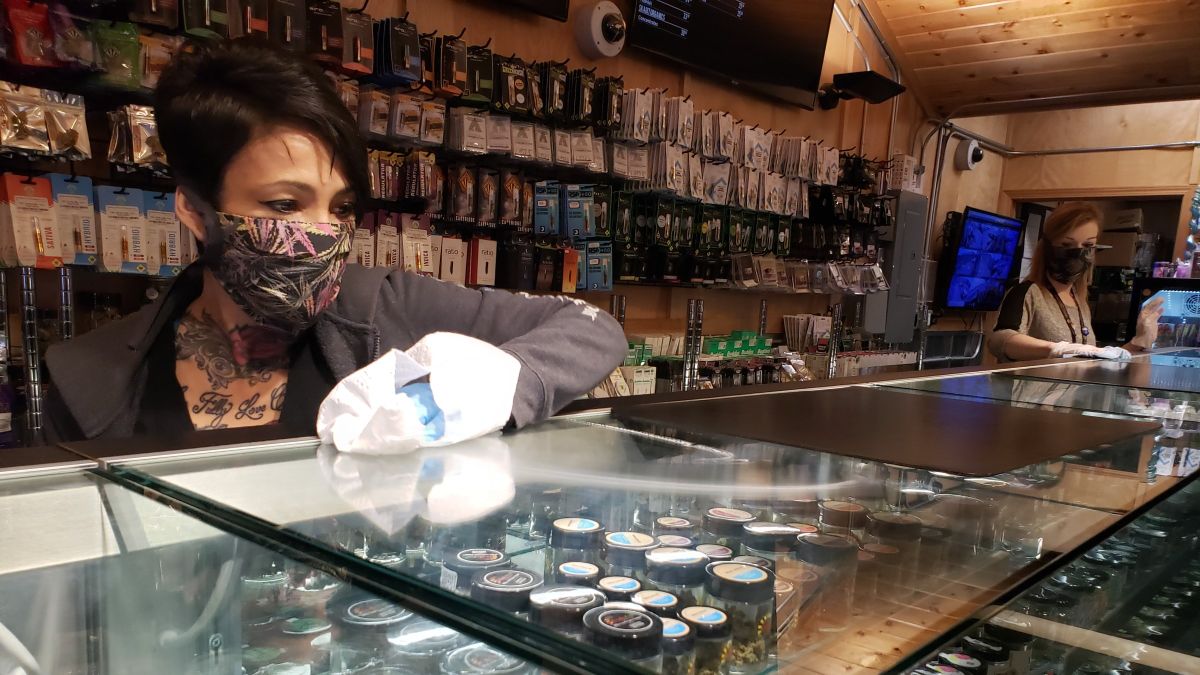Cannabis in a time of COVID-19
Shops balance customer service with improved sanitation

All Washingtonians have felt the impact of the 2019 novel coronavirus (COVID-19) outbreak, starting with event cancellations, remote working recommendations, school closures and, ultimately, a “shelter in place” order from Gov. Jay Inslee until May 4 (as of this writing), shuttering many businesses and services except those deemed essential for critical infrastructure.
While the federal government still prohibits the production and sale of cannabis, 502-licensed businesses have been declared essential due its use by medical marijuana patients. Many medical marijuana patients are also especially vulnerable to COVID-19.
“A lot of (our customers) have real medical issues that cannabis helps them cope with. This leads to a good portion of our customers being older or immunocompromised, essentially the high-risk category when it comes to COVID-19,” said Brandon St Germain, District Leader at Cannabis & Glass, a retailer with locations in north Spokane, Spokane Valley and Liberty Lake.
To protect both staff and customers, cannabis retailers are taking extra precautions to reduce the spread of COVID-19.
After clearing a temperature check at the start of a shift, Cannabis & Glass staff is required to wear gloves and masks while working. Budtenders on the sales floor also wear face shields and use hand sanitizer on their gloves between transactions. There are also timers set for every 30 minutes for entire store cleans, disinfecting all surfaces, ATMs, door handles, etc.
Cannabis retailer Apex Cannabis, which has locations in Otis Orchards, Moses Lake and central Spokane, has instituted similar precautionary measures, including an emphasis on enforcing social distancing.
“Like any societal behavior change, social distancing was not initially easy to implement,” explained Stacy Peterson, Apex Cannabis owner. “Our staff’s approach to enforcing social distancing is empathetic and understanding that these new norms can be frustrating.”
At both Apex Cannabis and Cannabis & Glass, 6-foot markings have been placed throughout the store to maintain social distance and reduce the number of customers allowed in the store at a time. Customers are not allowed to touch products until a sale is finalized.
Many cannabis retailers had already established an online pre-ordering program, and they are encouraging customers to use it. While customers will still need to pay cash when they arrive, it allows workers to compile an order in advance, reducing in-person transaction time.
In an effort to protect customers as well as workers, the Washington State Liquor and Cannabis Board has instituted temporary allowance of curbside service by cannabis retailers. This service is extended to all legal cannabis customers, not just card-holding medical marijuana patients, in order to reduce the number of visitors inside a store.
Despite the changes and challenges of these strange times, the Apex staff is staying positive and still smiling … even though you can’t see it, thanks to Stephanie Peterson, Stacey Peterson’s mother-in-law and Apex controller. She’s also an accomplished quilter, who had been gathering cannabis-themed fabrics to make a quilt for Christmas.
“When the CDC recommendation changed to recommending masks, Stephanie got online found a pattern and started building masks,” Stacey Peterson said.
Instead of a quilt, Stephanie used the 20 varieties of fabric to make masks for the entire Apex staff.
“The masks have been a hit with the staff and customers – who regularly ask where they can buy them. The cannabis-themed fabric masks were a nice way to protect our staff and infuse a little fun into this crazy situation.”
Cannabis & Glass is also striving to do some extra good at a difficult time. They’ve begun a Giving Back Initiative to donate personal protection equipment to health care workers and first responders, and are offering a 25% discount to health care workers throughout the duration of the pandemic.
Perhaps, after we have passed the critical points determined by public health officials to reduce the spread of the virus enough to safely return to previous routines, we may see some ongoing changes in the industry.
In Colorado, under temporary emergency rules established April 2, customers can pay for their marijuana order online, if the retailer works with a credit card company willing to process cannabis transactions. Several states, including Oregon and California, already allow delivery of both medical and recreational cannabis.
“Currently cannabis delivery is not allowed in Washington,” said Peterson. “I believe it is likely the COVID-19 outbreak will make it much more likely that the Legislature to be willing to consider cannabis delivery in the future.”
St Germain also believes this situation may lead to more social acceptance of cannabis and influence legalization efforts across the country.
“I-502 has only been around since 2012 and we have been deemed an essential business already; that in itself speaks volumes to what it is this industry provides,” he said.
“Cannabis is one of the best natural stress relievers there is … over half of America is reporting having their mental health negatively impacted by COVID-19. It’s times like this that the industry has the chance to show just how positively impactful cannabis can be for mental health.
“I think when we come out of this, and researchers start seeing how much better people in cannabis legal states coped with the isolation than those without access to cannabis, you’ll see a lot of states start to go green.”
Theresa Tanner is the Health & Culture editor of EVERCANNABIS. Born and raised in Spokane, she enjoys good food and drink, pop culture podcasts, and relaxing at the lake.